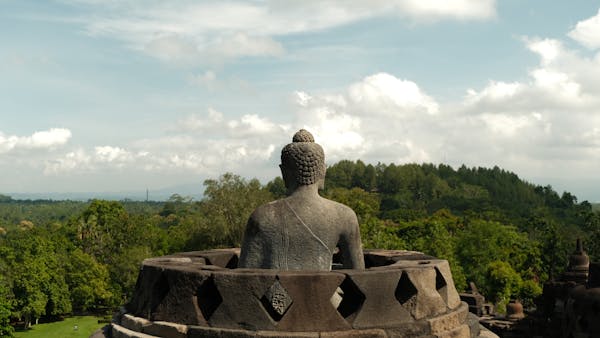Table of Contents
In the fast-paced world of 2025, the quest for inner peace and mental clarity has never been more crucial. As technology advances, societal pressure increases, and personal struggles take their toll, many people are turning towards ancient practices for solace.
One such practice, deeply rooted in Buddhism, is Vipassana meditation.
This is the powerful form of meditation that helps transform one’s life by unlocking inner peace and achieving a long-term balance of mind.
In this blog, we’ll delve into how Buddhism and Vipassana meditation help you transform your life by cultivating mindfulness, emotional resilience, and a deep understanding of self.

What is Buddhism?
Buddhism is an old religion that originated when Siddhartha Gautama, known as the Buddha, found it over 2,500 years ago.
The teachings at the core of Buddhism describe how suffering exists and what creates suffering and the manner in which the suffering will come to an end. It shows the path towards the ending of life’s very suffering that inherently exists.
Principles Central to Buddhism
Buddhism bases its beliefs on some central principles.
The Four Noble Truths: These teachings deal with the reality of suffering (Dukkha), its causes (attachment and craving), the possibility of ending suffering, and the path to freedom-the Eightfold Path.
The Eightfold Path: It is a way to ethical and mental development that leads to the end of suffering and enlightenment. Right Understanding, Right Intent, Right Speech, Right Action, Right Livelihood, Right Effort, Right Mindfulness, and Right Concentration are part of it.
Impermanence (Anicca), Suffering (Dukkha), and Non-self (Anatta): These are fundamental teachings that say everything in the world is impermanent, suffering is a part of life, and the self is not permanent but a composite of constantly changing things.
Mindfulness and awareness, both of which are very essential parts of Vipassana meditation.
Buddhism Vipassana Meditation
Vipassana meditation, often translated as “clear seeing” or “insight meditation,” is one of the oldest forms of meditation taught by the Buddha. It is a practice that involves cultivating deep awareness and insight into the nature of reality, particularly the impermanence of all things.
The primary aim of Vipassana meditation is to develop insight into the true nature of your mind, emotions, and body, which ultimately leads to liberation from suffering.
The Goal of Vipassana
The practice of Vipassana allows individuals to see the impermanent nature of all phenomena. Through this understanding, attachment to thoughts, emotions, and sensations fades, leading to greater peace and freedom.


How Does Vipassana Meditation Work?
Vipassana meditation is divided into several significant techniques that train the practitioners toward mindfulness and tremendous insight.
Monitoring the Breath
The central objective of Vipassana meditation is the observation of the breath. Practitioners focus entirely on the feelings of the inhalation and exhalation sensations in the body. Through fixation on the breath, they tend to stay at the present and develop mindfulness.
Monitoring Sensations
As the practitioner develops his meditation, he starts noticing bodily sensations and thoughts and emotions and not attached to these sensations. Vipassana supports non-reactivity to such sensations so as to bring out a sense of detachment and equanimity.
Insight into Impermanence
Through regular practice, meditators come to realize that everything is impermanent. Thoughts, emotions, and physical sensations arise and pass away. Through deep experiencing of this impermanence, one can start to disentangle from the cycle of craving and aversion that causes suffering.
Equanimity
The aim of Vipassana is to develop equanimity — a balanced, calm mind that remains unruffled by whatever is happening around it. This is a great tool for dealing with stress, anxiety, and negative emotions.
Benefits of Vipassana Meditation in 2025
As the world is changing day by day, more and more people are trying to find their ways to make their mental, emotional, and physical well-being better. Vipassana meditation is the way to peace and personal transformation, offering many benefits in this modern world.
Mental Health Benefits
Reduction in Anxiety and Stress: Vipassana meditation reduces anxiety by cultivating mindfulness, which enables the practitioner to free himself from obsessive thoughts and worries.
Improved Emotional Regulation: Regular practice leads to a better understanding of emotions, helping individuals respond to situations with greater clarity and calmness.
Enhanced Concentration: Vipassana meditation trains the mind to focus, which improves attention and productivity.
Physical Health Benefits
Lowered Blood Pressure: The relaxation caused by meditation has been proven to decrease blood pressure and enhance overall cardiovascular health.
Increased Mind-Body Awareness: Through mindfulness, practitioners become more attuned to their physical health, which can result in healthier lifestyle choices.
Improved Sleep: By calming the mind and reducing stress, Vipassana meditation helps improve sleep patterns and quality.
Spiritual and Philosophical Benefits
Deeper Connection to Self: Vipassana provides the individual with self- awareness, hence deeper perception of his true self.
Rise in Compassion and Loving-kindness: The person observing his suffering and nature of others feels empathy and a sort of bonding.
Liberation from Suffering: This connection is free from the cycle of attachment and suffering with the realization of life as impermanent.


Vipassana and Buddhism – A Conjunctive Relationship
Vipassana meditation is closely related to Buddhist teachings.
In fact, it is one of the most effective methods for applying the Buddha’s teachings to daily life. The practice of Vipassana enables individuals to walk the Eightfold Path, particularly in terms of Right Mindfulness and Right Concentration.
Mindfulness in Buddhism
The essence of Buddhism lies in mindfulness. In Vipassana, mindfulness is applied by observing the breath, sensations, and thoughts in an objective and non-judgmental manner. It helps to bring about wisdom and eradicate ignorance.
The Cycle of Suffering
Dukkha or suffering, as defined by the Buddhist philosophy, is caused by attachment and craving. Vipassana meditation helps the practitioners understand the cause of suffering and leads them towards freedom and enlightenment, Nirvana.
How to Start Practicing Vipassana Meditation
Though Vipassana meditation is deep in practice, it is accessible to anyone willing to make the time and effort. Here’s how you can get started:
Preparation for Practice
Setting an Intention: First of all, it is important to begin with some kind of clear intention. Ask yourself why you want to meditate and what you hope to achieve from the practice.
Developing a Peaceful Environment: Look for a serene and peaceful space free from interruptions that can aid you in keeping your mind clear during meditation.
Position and Support: Sit with comfort on a chair or the floor. Rest your back while supporting your entire body so you won’t experience any pain while you meditate and help in improving your focus.
Step by Step
Focus on Your Breath: Close your eyes and focus on your breathing. Note how your abdomen is rising and falling or feel the sensation of the air coming into and going out of your nostrils.
Notice Sensations: Continue breathing as you bring your attention to physical sensations in your body. You simply notice the sensations, no judgment, no attachment.
Maintain Present Awareness: When the mind wanders, bring it back to breathing or bodily sensation, each time returning to the present.
Difficulty in Practice
Dealing with Distractions: The wandering of the mind is natural. If your attention drifts out, don’t get frustrated with it; you simply bring back your focus towards the breath
Patience in Meditation: There is no other way but step by step through practice. Greater insights and quietness will definitely come through in due course if you keep meditating regularly.
Vipassana Retreats: The Intensive Path to Inner Serenity
For those looking to deepen their practice, Vipassana retreats offer a structured and immersive environment. The retreats are usually held in Buddhist centers across the globe and provide an opportunity for intense focus and insight over several days.
What is a Vipassana Retreat?
A typical Vipassana retreat lasts 10 days, where participants engage in full-time meditation, observe noble silence (no speaking), and follow a set daily schedule. These retreats are designed to help you immerse yourself fully in meditation and cultivate deep insight.
Benefits of a Vipassana Retreat
Retreats are focused environments where distractions are minimized, and therefore, there is more introspection and progress in meditation practice.
Many people find that a retreat experience accelerates their spiritual growth and offers profound shifts in perspective.
The Role of Buddhism in Modern Society
As the world becomes more fast-paced and uncertain, many people are turning to Buddhism for guidance.
The teachings of mindfulness, compassion, and impermanence are incredibly relevant today as they provide practical tools for managing stress, building resilience, and fostering emotional well-being.
Spiritual Practice in a Secular World
While Buddhism is indeed a religion, many people around the world follow its philosophy today in a non-religious setting.
Buddhism presents a philosophy to live mindfully that can benefit anyone regardless of their religious affiliations and even assist those searching for mental clarity and personal change.


Debunking Common Myths About Buddhism and Vipassana Meditation
There are so many myths regarding Buddhism and Vipassana meditation. Let’s debunk some common myths here:
Myth 1: You Must Be Religious to Practice
Vipassana meditation is for everyone, regardless of religion. It’s all about personal growth and understanding, not religious dogma.
Myth 2: Meditation Is Easy
Meditation requires patience and commitment. It can be tough, especially at first, but the rewards are well worth the effort.
Myth 3: Vipassana Is About Emptying the Mind
The goal of Vipassana is not to empty the mind but to observe thoughts and sensations without attachment or judgment. This leads to a clearer and more peaceful mind over time.
How Vipassana Meditation Can Transform Your Life in 2025
Most people in today’s world are seeking meaning and purpose. Vipassana meditation offers a route to mental clarity, emotional resilience, and deep understanding of the self.
In embracing the practice of Vipassana, you can have more presence, break free from negative thought patterns, and establish inner peace for life.
Conclusion
Vipassana meditation, grounded in the philosophies of Buddhism, is one such transformative journey into life for 2025. By implementing Vipassana in daily life, a profound sense of peace, clarity of mind, and emotional equilibrium will be unfolded.
Whether just starting or continuing deepening into it, now begins the path of mindfulness and inner freedom. Embark upon this transformative experience with Vipassana for true peace and satisfaction in life.
